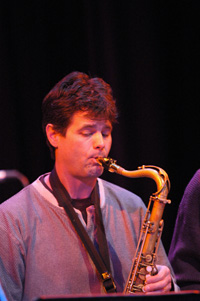"My teaching style adapts to each individual student. I try to find their strengths and weaknesses and work accordingly. I encourage my students to dig deep inside and find their personal voice. I guide them to the answers without just giving up the information. I truly believe that one learns and retains information by doing the work."
"My priorities as a teacher are to see that all students get as much from me as they can in the short period of time that I see them. I make sure they fully understand the topics we are discussing before moving on to something new. I also try to guide them in the direction that might best suit their particular relationship to the instrument. Not all of my students are trying to become the next great jazz saxophonist."
"A good saxophonist, first and foremost, has to have a tremendous sound. Without a great sound, there is only noise. Secondarily, he or she needs a strong command of the instrument. The saxophone is a great instrument for demonstrating speed and dexterity. The saxophone is also one of the most expressive instruments. It probably resembles the human voice most closely in flexibility and nuance, as well as the personality of the sound. Every saxophonist has a personal sound."
"I have always tried to bring my performance ethics into my teaching studio. I am a very intense and energetic teacher, and this is how I approach my instrument. What I like about teaching at Berklee is the freedom I'm allowed with my students and my teaching style. I am allowed to pass on my own ideas without being constrained by a particular guideline. I've had great results and extremely positive feedback from my students about my personal approach to the saxophone and improvisation."

